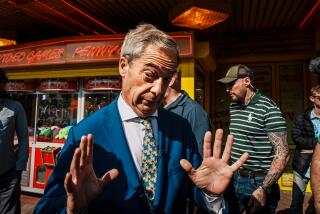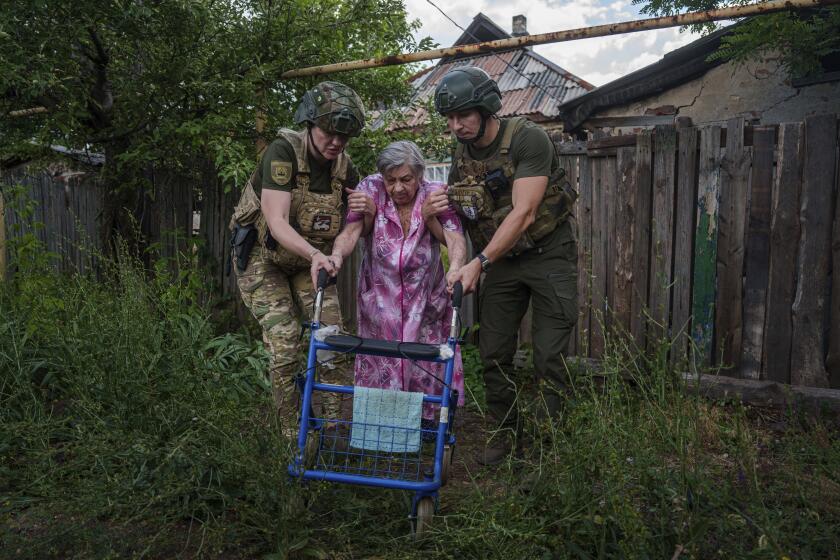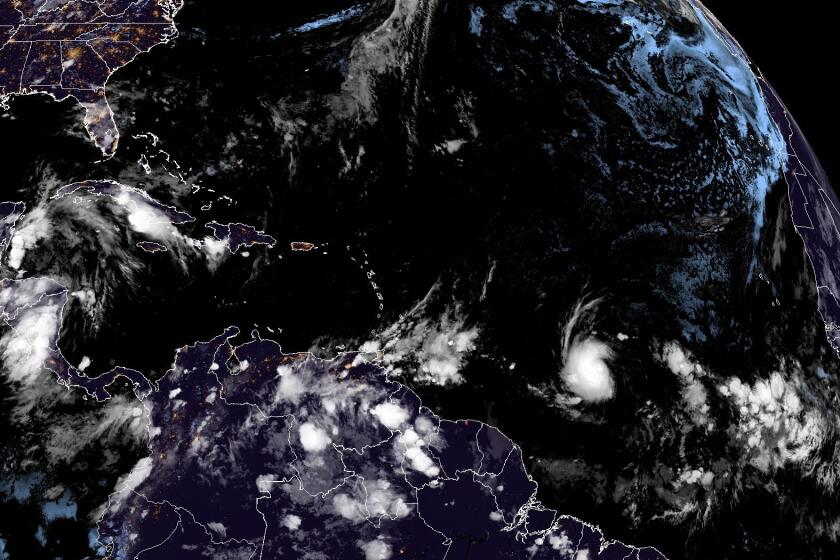Reagan, Gorbachev Trade Peace Pleas : Leaders Exchange New Year Greetings in TV Talks to American, Soviet People
President Reagan and Soviet leader Mikhail S. Gorbachev began the new year Wednesday with historic, televised peace appeals directed at the American and Soviet people.
Reagan, in a five-minute address carried by the Soviet state television network, made no direct mention of Afghanistan and other sore points in U.S.-Soviet relations, but emphasized that “there is much work to be done” before the two nations can enjoy genuine peace.
Gorbachev’s message, broadcast simultaneously on American major commercial networks, expressed hope for a reduction of mistrust between the two superpowers.
In Moscow, the main evening television news program began with Reagan’s New Year’s greeting and his simple appeal: “Let’s work together to make it a year of peace. There is no better goal for 1986.”
Reagan also emphasized the importance of human rights and defended his plan, condemned by the Kremlin, for starting a space-based missile defense system.
On TV screens in the United States, Gorbachev appeared with the greeting “Dear Americans,” and he went on to say that he saw “a good augury in the way we are beginning the new year, which has been declared the year of peace.”
There was no immediate official reaction in the Soviet Union to Reagan’s extraordinary appearance, unprecedented since President Richard M. Nixon addressed the Soviet people via television in 1972.
Reagan’s appearance on Soviet TV appeared to alter the harsh portrait the Kremlin has painted of the President. A Soviet office worker said of Reagan’s presentation: “It produced a better impression than I expected. He is a very smooth speaker.”
Several Soviet citizens said they were heartened by Reagan’s words of peace, though one elderly woman in Moscow commented, “They talk beautifully, but it’s only talking so far.”
Reagan watched Gorbachev’s speech from the Palm Springs estate of millionaire publisher Walter H. Annenberg, where he and Mrs. Reagan were spending the New Year’s holiday. The President later issued a brief statement welcoming the Soviet greeting as “a continuation of our discussion in Geneva.”
Reagan’s message, taped Saturday in Los Angeles, urged a continuation of the “fresh chapter” in U.S.-Soviet relations that began with the President’s November meeting with Gorbachev in Geneva.
‘Better Understanding’
“While there were many areas (in) which we did not agree, which was to be expected, we left Geneva with a better understanding of one another and of the goals we each have,” Reagan said. “We are determined to build on that understanding in the coming months and years.”
White House spokesman Larry Speakes called Reagan’s speech a “hopeful expression” of progress in Soviet-American relations.
“Let us hope that these words will be the foundation for making 1986 the year of peace our peoples deserve,” he said.
Reagan personally wrote his speech last week from drafts prepared by the State Department and the National Security Council. The finished product, delivered before a homespun backdrop of American and presidential flags, two family pictures and a pot of poinsettias acquired from a hotel flower shop, contained no new proposals for the Soviets.
It opened with the simple phrase, “Good evening. This is Ronald Reagan, President of the United States of America,” and concluded with wishes for chistoye nyebo-- clear skies or fair weather--for all mankind in 1986.
Reagan assured the Soviets, as he has before, that the United States means no harm to the Soviet people and that Reagan believes a nuclear war cannot be won.
He also repeated American hopes that U.S.-Soviet arms reduction talks, set to resume shortly in Geneva, will make speedier progress toward the goal of a 50% reduction in nuclear weapons, agreed to in principle at Geneva in November.
Much of the message was aimed at giving the Soviet people a rare glimpse of the American view of some sticking points in the bilateral relationship, including human rights and the U.S. Strategic Defense Initiative, the “Star Wars” space defense program.
‘Star Wars’ Attacked
The Soviets have vociferously attacked “Star Wars” as an effort to expand the nuclear arms race into space. The President alluded to the Soviet Union’s own space defense research efforts.
“Both the United States and the Soviet Union are doing research on the possibilities of applying new technologies to the cause of defense,” he said. “If these technologies become a reality, it is my dream that, well, to one day free us all from the threat of nuclear destruction” by erecting invulnerable shields to incoming missiles.
On the human rights front, the President explained that the American “democratic system is founded on the belief in the sanctity of human life and the rights of the individual--rights such as freedom of speech, of assembly, of movement and of worship.”
“Progress in resolving humanitarian issues in a spirit of cooperation would go a long way to making 1986 a better year for all of us,” he said.
Reagan’s references to human rights annoyed at least one Soviet viewer. “Why did he have to get into human rights again?” asked a middle-aged Muscovite woman. “We do not have any such problems.”
Reagan’s greeting contained no specific reference to Washington’s unhappiness over Soviet involvement in conflicts in Afghanistan and Nicaragua. The President said only that regional conflicts cause “much human suffering” and must be ended to assure a lasting peace.
In his remarks, Gorbachev said: “The few minutes that I will be speaking to you strike me as a meaningful symbol of our mutual willingness to go on moving toward each other, which is what your President and I began doing at Geneva.
‘Dedicated to Peace’
“Our peoples . . . want the constructive Soviet-American dialogue to continue uninterrupted and to yield tangible results. As I face you today, I want to say that Soviet people are dedicated to peace--that supreme value equal to the gift of life.”
Gorbachev acknowledged that “the gap dividing us is still wide,” and that “to bridge it will not be easy, but we saw in Geneva that it can be done.”
Remarks Differed Slightly
The Russian translation of Reagan’s remarks differed only slightly from the English-language version distributed by the U.S. Embassy.
For example, Reagan spoke of “our wonderful country,” but the Russian interpreter dropped the word wonderful.
In a section dealing with human rights, Reagan referred to an agreement with Gorbachev on resolving humanitarian issues, but this was altered in the Russian translation to “issues concerning individual citizens,” a narrower definition.
Otherwise, the Russian version faithfully reflected Reagan’s text.
Michael Wines, a member of The Times Washington Bureau, is traveling with the President. William J. Eaton is chief of the Times bureau in Moscow. Staff Writer Eleanor Clift in Washington also contributed to this story.
More to Read
Start your day right
Sign up for Essential California for news, features and recommendations from the L.A. Times and beyond in your inbox six days a week.
You may occasionally receive promotional content from the Los Angeles Times.






